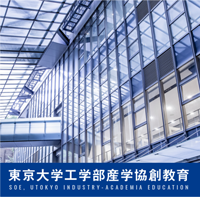Information
Index
Information
Department of Civil Engineering
Decision-making is required in various cases regarding civil engineering design, planning, management and policy making situations. The observation, analysis and presentation of information are vital to objectively grasp objectives and phenomena and to make decisions. Information related to civil engineering includes a variety of phenomena including structural and human behaviors, and natural phenomena such as geographical features and the environment. Scales cover a wide range, from an individual structure to the global planet. Both are subject to information linked to real space. We promote education and research on the measurement, analysis, presentation and comprehensive value judgment of such information. We aim to make multidisciplinary contributions from an information stance to an interdisciplinary civil engineering with diverse subjects.
Department of Urban Engineering
Knowledge and techniques to deal with various urban issues and concrete planning and development methods can be acquired through classwork and practical training in the Department of Urban Engineering.
Information is one of the important keywords in urban engineering. Understanding the state of a city and processing a variety of relevant information is essential before a problem-solving method is considered for issue resolution. Computers used for urban monitoring and analysis, CAD used for urban design, GPS used for understanding vehicle and pedestrian behavior, real time traffic congestion monitoring, support for evacuations and relief activities, support for the elderly and those with ambulatory difficulties and the provision of appropriate information closely link urban and information systems. In the Department of Urban Engineering, one can understand the trends of these latest technologies and address urban issue resolution while actually putting diverse information systems to use in practical training sessions, for a graduation thesis, diploma designs and the like.
Department of Mechano-Informatics
Education and research in the Department of Mechano-Informatics are conducted to create new horizons by intimately melding information with the real world without information being constrained to the information world. Virtual reality and AR interface technology that integrate humans and computers as a whole to realize advanced information processing systems; intelligent constructions to understand the real world by using the vast amount of information on the web; and humanoid robot systems whose behavior allows them to understand and independently computerize the real world are among such examples.
Our imaginative and creative approach allows students to systematically understand the abovementioned items not only through coursework on robot systems, robot control, software levels one through three, robot intelligence, pattern informatics, human interface and the like, but also through practical training such as media infrastructure, image processing, real world recognition, computer graphics, robot action programming and so on.
Department of Aeronautics and Astronautics
Aerospace engineering and information technology share a deep connection. Researchers in aerospace engineering have contributed to the advancement of information technology from the dawn of computers. As regards aerospace systems having used information technologies in real time operations and flow visualization having been used for information technologies, accomplishments unique to aerospace have been accumulating for some time, but nowadays, contributions from aerospace engineering can be seen in every information technology field.
One example is data mining technology and the like used to detect knowledge in large quantities of sensor data sent from spacecraft. The use of small unmanned aerial vehicles as media for information collection and transmission and so on is another field. From the fundamental to applied, aerospace engineering supported by information technology and information technology generated from aerospace engineering, are both put to use in education and research in the Department of Aeronautics and Astronautics.
Department of Information and Communication Engineering
The systematic education in the Department of Information and Communication Engineering is directly connected to the information and telecommunications industry (digital content, Internet, mobile network, social network and the like) which accounts for approximately one third of the real GDP growth in Japan. The curriculum begins with learning the fundamentals of information and communication technology such as digital circuits, computer (CPU) theory, programming, algorithms, information theory, signal processing. Thereafter, learning advances to basic theories that make computers more “rational and advanced” such as image processing, voice processing, natural language processing, machine learning and the like; and learning subsequently delves deeper into the “core” of information and communications technology with programming language, wireless communications, the internet, and so on. Time is taken in practical training to learn about software construction methods that make full use of interacting with the real world such as video, sound, networks and the like and typical mid-range software, language processors and the like. Once those foundations have been mastered, research dealing with basic technology supporting information and communications, the creation of novel services, new human and machine interaction technology, and various issues such as the environment and energy that require “smart” resolutions on a global scale is added. This department is for those wanting to learn core information and communication technology that both now and into the future will continue to visibly change the lives of people.
Department of Applied Physics
Quantum information science, which appeared at the end of the 20th century, is the field of information science covered by the Department of Applied Physics. Quantum information science integrates the fields of quantum mechanics and information science, the central theme of which is the correlation between pairs or groups of particles called quantum entanglements. This is also a significant theme for condensed matter physics = the physics of complex quantum systems, which has been a Department of Applied Physics strength, and that the experience can be perfectly demonstrated is yet another theme. The use of semiconductor quantum dots in quantum bits and quantum entanglement in the Department of Applied Physics can be said to be a typical example. The Department of Applied Physics is also strong in optical science, and even using light quantum entanglement is generated and quantum algorithms are realized. In the Department of Applied Physics, we aim to realize quantum computers using technology arising from these studies.
Department of Mathematical Engineering and Information Physics
Pursue ‘universal principles and methodology’! These are the basis of science and technology. This is the goal of the Department of Mathematical Engineering and Information Physics. Researching this ‘universal principles and methodology’ is indivisible from research in individual fields, and in the Department of Mathematical Engineering and Information Physics research in various fields is conducted along with researching the ‘universal principles and methodology’.
As a field related with “information”, examples of research being conducted include information theory, signal processing, cryptography theory, calculation algorithms, language processing, high performance computer architecture, five-sense information processing, virtual reality, brain function analysis and its application to the construction of a human support system. In the department curriculum, students acquire ‘universal principles and methodology’ basics in lectures, develop principles and methodologies through research for graduation, and engage in resolving practical issues.
Department of Chemical System Engineering
In the Department of Chemical System Engineering it is possible to analyze and control chemical phenomenon with scales from molecular to global in size, and with a focus on the systemization and design of these components, a chemical system engineering methodology can be acquired.
This department creates new information by extracting and relevantly integrating each element. Thus, the major distinction of this department is the proactive application of constructive method chemical phenomena based on information science. Specifically, this includes the extraction of electronic information, the integration of chemical data by chemoinformatics, the design of industrial processes by the integration of reaction processes, and the design of medical social systems by integrating information from individual medical institutions. Chemistry exercises using computers and simulators are also actively carried out to foster talented individuals to realize these.
Department of Systems Innovation
There are many schools and departments, where you can study information technology, but there are limited places to learn the value of information, the practical use of information and so on. However, actual information systems have the potential to bring people together, create and execute business strategies that influence businesses, and enable transportation systems that can move safely and efficiently. These systems, formed by information networks, are the nervous system in a working human.
The Department of Systems Innovation provides knowledge and technology related to the role of information in a system, the visualization of data using computers, methods for acquiring information through simulation and the like. We nurture talented individuals who have the capacity to understand and utilize the potential dynamics of our society which is a financial market, a production and consumption sphere and an educational and research arena.



